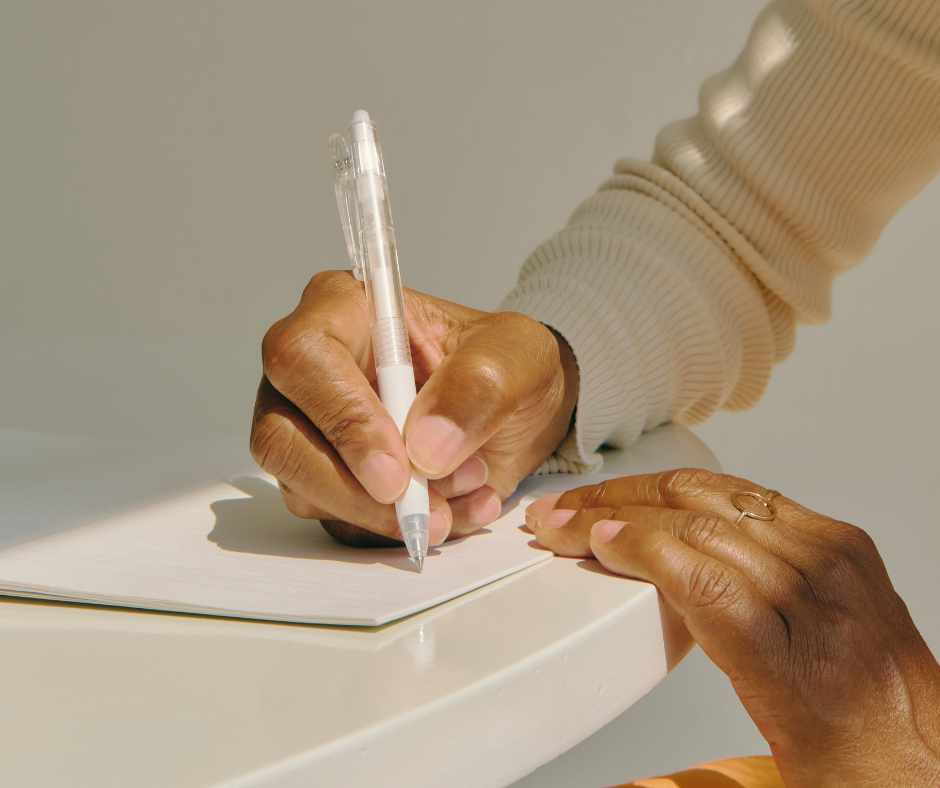

Why Journal? These Are the Many Benefits of Journaling
Summary
Reflection Questions
Journal Prompt
Developing a journaling practice is not indulgent. It offers a number of psychological health benefits by helping writers develop self awareness, problem solve, address painful emotions, understand negative thoughts, and so much more. Journaling might also provide physical health benefits by reducing stress, improving sleep, and aiding in pain management. Let’s explore those benefits below!
Journaling as an Adjunctive Mental Health Therapy


Journaling has been found to have significant positive effects on mental health, including reducing anxiety and aiding in the management of conditions like depression and PTSD (Post-Traumatic Stress Disorder). While it may not be a standalone treatment for these conditions, journaling can complement other therapeutic interventions and self-care practices, contributing to improved mental health and well-being.
Anxiety Reduction
Therapists might consider integrating journaling alongside psychiatric treatment and talk therapy to help women in their care manage anxiety. Journaling provides an outlet for individuals to express their worries, fears, and anxieties in a safe and private space.
By putting these thoughts and feelings into words, individuals often experience a sense of relief and catharsis, which can help reduce the intensity of elevated anxiety symptoms. Additionally, journaling time can promote mindfulness and self-awareness, allowing individuals to recognize and challenge anxious thought patterns.
Depression Management
Writing in a journal can be therapeutic for individuals struggling with depression. Journaling allows them to explore their emotions, identify negative thought patterns, and track their mood over time. By gaining insight into their triggers and coping mechanisms, individuals can develop healthier ways of managing their depression symptoms. Additionally, expressing gratitude and focusing on positive experiences in a journal can help shift their perspective and improve their overall mood.
PTSD Support


For individuals with PTSD, journaling can be a valuable tool for processing traumatic experiences and managing symptoms. Writing about traumatic events in a structured and controlled manner, as part of a therapeutic approach called narrative exposure therapy, can help individuals make sense of their experiences and reduce the emotional distress associated with PTSD. Additionally, some start journaling serve as a form of self-soothing and self-care, providing a safe space for individuals to express their emotions and work through the challenges of living with PTSD.
Disclaimer for Journaling as PTSD Support
However, this type of journaling should be led by a therapist. It might not aid emotional healing and could actually be harmful for certain women. For example, the 2018 study “Online Positive Affect Journaling in the Improvement of Mental Distress and Well-Being in General Medical Patients With Elevated Anxiety Symptoms: A Preliminary Randomized Controlled Trial” investigated the effectiveness of online positive affect journaling in improving mental distress and well-being in general medical patients with elevated anxiety symptoms.
The study found that positive journal entries are “Likely to be a more pleasant and uplifting treatment for patients compared with the traditional expressive writing interventions that focus on writing about deeply distressing and traumatic experiences from the past.”
What is Positive Affect Journaling?
Positive affect journaling involves the practice of intentionally focusing on and recording positive emotions, experiences, and aspects of one’s life. It typically involves writing about things that bring joy, gratitude, happiness, or satisfaction. The goal of positive affect journaling is to cultivate a more positive outlook, enhance well-being, and build resilience. For example, gratitude journaling is a type of PAJ.
10 Journaling Benefits That Make the Case for This Practice
#1 Developing Self-Awareness


Journaling can be particularly beneficial for increasing a woman’s self-awareness by providing a private space for reflection, expression, and exploration of her thoughts and emotions. Through regular journaling, a woman can delve into her inner world, gaining insights into her beliefs, values, and aspirations.
Writing about her experiences allows her to process and make sense of her emotions, leading to a deeper understanding of herself and how she relates to the world around her. This introspective practice fosters self-awareness by encouraging her to examine her thoughts and behaviors, uncovering patterns and motivations that may have previously gone unnoticed.
Tracking Personal Growth
Journaling enables one to track her personal growth journey over time. By documenting her thoughts, feelings, and experiences in a journal, she creates a tangible record of her evolution and development. Reflecting on past entries allows her to see how she has changed, what lessons she has learned, and how she has overcome challenges. This retrospective analysis provides valuable insights into her strengths, weaknesses, and areas for growth, empowering her to make informed decisions and navigate life with greater clarity and confidence.
Fuel your creative fire & be a part of a supportive community that values how you love to live.
subscribe to our newsletter
*please check your Spam folder for the latest DesignDash Magazine issue immediately after subscription


Journaling can also help women cultivate self-compassion and acceptance. Through writing, she can practice kindness and understanding towards herself, especially when exploring difficult emotions or confronting inner conflicts. Journaling offers a judgment-free space where she can express herself authentically, without fear of criticism or rejection. This process of self-expression and self-reflection fosters a deeper connection with her innermost thoughts and feelings, fostering a sense of acceptance and appreciation for her unique identity and journey. In turn, this heightened self-awareness strengthens her emotional resilience and empowers her to live a more authentic and fulfilling life.
#2 Accepting Negative Emotions Instead of Ignoring Them


Next on our list of journal benefits is learning to accept “negative” feelings instead of just focusing on the positive aspects of your life. Journaling provides an outlet for expressing emotions, thoughts, and experiences, which can help individuals process their feelings and reduce stress. It can serve as a safe space to unload emotions without fear of judgment.
Through reflective journaling, women can articulate their emotions with honesty and authenticity, allowing them to acknowledge and validate their experiences without fear of criticism or rejection. This process of self-expression fosters a sense of acceptance and validation, enabling women to embrace their emotions as valid and natural aspects of their human experience.
Furthermore, journaling facilitates emotional processing and release, allowing women to vent their feelings and untangle complex emotions on paper. By putting their thoughts and emotions into words, women can gain clarity and insight into the root causes of their negative feelings, enabling them to understand and address them more effectively. Writing about their emotions also provides a sense of catharsis and relief, allowing women to release pent-up tension and stress, which in turn promotes emotional well-being and resilience.
Journaling encourages women to cultivate self-compassion and kindness towards themselves, too—even in the face of negative emotions. Through writing, women can practice self-care and self-nurturing by offering themselves words of comfort, encouragement, and understanding. This process of self-compassion helps women develop a more compassionate and accepting attitude towards their own struggles and imperfections, fostering a sense of self-love and worthiness. By embracing their negative emotions with compassion and acceptance, women can cultivate a deeper sense of inner peace and contentment, empowering them to navigate life’s challenges with grace and resilience.
#3 Problem Solving


Journaling can provide a structured and reflective space to explore challenges, brainstorm solutions, and gain clarity on potential courses of action. Through writing, women can articulate the specifics of the problem they’re facing, breaking it down into manageable components and identifying the underlying issues at play. This process of defining the problem helps women gain a deeper understanding of its complexities, enabling them to approach it with greater clarity and focus.
Plus, journaling encourages women to engage in active problem-solving strategies, such as brainstorming, listing potential solutions, and evaluating their feasibility and effectiveness. By writing down their thoughts and ideas, women can generate multiple perspectives and consider alternative approaches to addressing the problem. This helps women develop critical thinking skills that empower them to solve other problems in the future. Journaling also provides a space for women to weigh the pros and cons of different solutions, anticipate potential obstacles, and develop contingency plans, empowering them to make informed and strategic decisions.
Journaling fosters a sense of empowerment and agency by helping women take ownership of their problems and develop proactive strategies for resolving them. By documenting their problem-solving process in a journal, women can track their progress, celebrate small victories, and learn from setbacks. This reflective practice not only builds confidence in their ability to overcome challenges but also cultivates resilience and adaptability in the face of adversity. Ultimately, journaling equips women with the skills and mindset needed to tackle problems head-on, empowering them to navigate life’s complexities with confidence and resourcefulness.
#4 Setting Goals and Enhancing Achievement


Through journaling, women can clarify their aspirations, break them down into specific, actionable steps, and establish a timeline for completion. Writing down their goals makes them more tangible and concrete, enhancing motivation and commitment to follow through.
Journaling allows women to reflect on their goals regularly, assessing their progress, celebrating successes, and identifying areas for improvement. By recording their achievements and setbacks in a journal, women can gain valuable insights into what strategies are working and where adjustments may be needed. This reflective practice fosters a sense of self-awareness and empowers women to adapt their approach as needed to stay on track toward their goals.
Journaling also serves as a source of inspiration and encouragement, providing a space for women to envision their ideal future and articulate the steps needed to get there. By writing about their dreams and aspirations, women can tap into their intrinsic motivations, clarify their priorities, and stay focused on what truly matters to them. Additionally, journaling allows women to cultivate a positive mindset and overcome self-doubt by recording their progress, affirming their capabilities, and reminding themselves of past successes, ultimately empowering them to achieve their goals with confidence and resilience.
#5 Boosting Creativity and Finding Inspiration


By providing a blank canvas for self-expression, journaling allows women to unleash their imagination, explore new ideas, and experiment with different forms of creative expression. Whether through writing, drawing, doodling, or collage, journaling encourages women to tap into their inner creativity and give voice to their unique perspectives and insights. This creative process not only sparks inspiration but also cultivates a sense of freedom and playfulness, enabling women to approach challenges with fresh eyes and innovative solutions.
Journaling serves as a repository for capturing and preserving moments of inspiration that strike at unexpected times. By jotting down ideas, observations, and sparks of creativity in a journal, women can capture fleeting thoughts and insights before they fade away. This practice not only fuels ongoing creativity but also provides a rich source of inspiration to draw upon during periods of creative block or stagnation.
Additionally, regular journal entries allow women to reflect on their creative journey over time, tracking their growth, evolution, and the connections between seemingly disparate ideas. Ultimately, journaling sessions empower women to cultivate and nurture their creative spirit, leading to greater fulfillment, self-expression, and innovation in all aspects of their lives.
#6 Preserving Your Memories and Increasing Working Memory Capacity


By writing about their daily experiences, thoughts, and emotions, women can create a written record of significant events and moments in their lives. This process not only allows them to capture memories for future reflection but also strengthens their ability to recall information by engaging their working memory. As women write in their journals, they actively process and encode information, reinforcing neural pathways associated with memory retention and retrieval.
How Does Journaling Enhance Memory Performance?
Journaling acts as a cognitive exercise that challenges women to flex their working memory muscles. According to this 2001 study, “Expressive writing can increase working memory capacity,” which is great news for any journaler! As they organize their thoughts, articulate ideas, and connect disparate pieces of information in their writing, women engage in mental processes that require active manipulation and retention of information. This cognitive workout helps sharpen their working memory skills, enabling them to hold and manipulate information more effectively in their minds. Over time, regular journaling can lead to improvements in working memory capacity, allowing women to think more clearly, make connections more easily, and navigate complex tasks with greater efficiency.
Furthermore, the act of journaling itself can serve as a mnemonic device for enhancing memory performance. By associating written cues with specific memories or information, women create mental hooks that facilitate memory retrieval. The act of writing also reinforces semantic encoding, making it easier to recall information later on. Additionally, journaling allows women to externalize their thoughts and offload mental burdens, freeing up cognitive resources for other tasks and activities. In this way, journaling not only preserves memories but also optimizes cognitive function, enhancing working memory capacity and overall cognitive performance in women.
#7 Improving Physical Health Through Stress Reduction and More


While the direct physical health benefits of journaling may not be as pronounced as its mental and emotional benefits, the practice can contribute to a holistic approach to wellness by promoting stress reduction, immune support, pain management, better sleep, and the cultivation of healthy habits.
Stress Reduction
Journaling has been shown to reduce stress levels by providing a constructive outlet for processing emotions and venting frustrations. Even writing in a gratitude journal can help reduce stress. Lower stress levels can lead to various physical health benefits, such as reduced risk of cardiovascular disease, improved immune function, and better sleep quality.
Immune System Support
Chronic stress can weaken the immune system, making individuals more susceptible to illnesses. By reducing stress levels, journaling may indirectly support immune function, helping the body better defend against infections and diseases.
Pain Management
Some studies suggest that expressive writing, a form of journaling where individuals write about traumatic or emotionally challenging experiences, can help alleviate physical pain. By processing and coming to terms with emotional distress, individuals may experience a reduction in physical symptoms associated with pain conditions.
Better Sleep
Journaling before bedtime can help clear the mind of worries and anxieties, leading to improved sleep quality. Adequate sleep is essential for overall physical health, as it supports immune function, cognitive performance, and mood regulation.
Healthy Habits
Journaling can also be used to track health-related behaviors, such as exercise, diet, and medication adherence. By recording these habits in a journal, individuals can gain insight into their health patterns and make positive changes to support their overall well-being.
#8 Improving Communication Skills


Journaling can also contribute to improved communication skills in women by providing a platform for practicing articulation, organization of thoughts, and self-expression. Through each journal entry, women can refine their ability to convey ideas clearly and effectively. By consistently putting thoughts into words in their journals, they develop a greater command of language, vocabulary, and sentence structure, which can translate into more confident and articulate verbal communication in both personal and professional settings.
Moreover, the journaling process encourages women to explore their own thoughts and feelings in depth, fostering self-awareness and introspection. This self-reflection enhances emotional intelligence and empathy, enabling women to better understand their own perspectives and those of others. As they become more attuned to their own emotions and experiences through journaling, women also become more adept at recognizing and empathizing with the emotions and perspectives of others, leading to more empathetic and effective communication in their interpersonal relationships.
#9 Enhancing Accountability for Your Actions
Journaling fosters accountability in women by providing a structured platform for setting goals, tracking progress, and reflecting on outcomes. Through writing, women can establish clear objectives and action plans, holding themselves accountable for taking concrete steps towards their aspirations. By documenting their goals in a journal, along with specific strategies and deadlines, women create a tangible record of their intentions, making it easier to stay focused and committed to their objectives over time.
Furthermore, journaling enables women to monitor their progress and evaluate their efforts objectively. By regularly reviewing their journal entries, women can assess whether they are making meaningful strides towards their goals or if adjustments need to be made to their approach. This process of self-assessment promotes accountability by encouraging women to take ownership of their actions and outcomes, rather than making excuses or shifting blame. Additionally, sharing progress updates and reflections with trusted individuals, such as mentors or accountability partners, can further reinforce accountability and provide valuable support and encouragement along the journey toward achieving their goals.
#10 Expressing Yourself Authentically!


Journaling serves as a powerful medium for self-expression in women, offering a safe and judgment-free space to explore their thoughts, feelings, and experiences. Through writing, women can articulate their innermost thoughts and emotions with honesty and authenticity, allowing them to express themselves in ways that may be difficult to convey verbally. Whether describing personal experiences, reflecting on challenges, or expressing creative ideas, journaling provides a creative outlet for women to freely express their unique perspectives and voices.
Journaling also encourages women to embrace their creativity and experiment with different forms of self-expression, such as poetry, storytelling, dream journaling, or visual art. By engaging in creative writing exercises, doodling, or incorporating multimedia elements into their journals, women can unleash their imagination and tap into their innate creativity. This process of self-expression not only fosters a deeper connection with oneself but also promotes self-discovery and personal growth. Additionally, sharing their journals with others, whether through personal conversations or public platforms, can further amplify the impact of their self-expression, fostering connection, empathy, and understanding among diverse individuals and communities.
Ready to Start Your Journaling Journey?
Whether your goal is to enhance your writing skills or support mental well being, journaling could help you! By dedicating time to reflect, process emotions, set goals, and express themselves authentically, women can cultivate a deeper understanding of themselves, navigate life’s challenges with resilience, and foster personal growth and well-being.
Journaling provides a flexible and accessible tool for women to explore their inner worlds, celebrate their accomplishments, and connect with their creativity and intuition. Ultimately, by embracing journaling as a regular practice, women empower themselves to cultivate a more fulfilling and authentic life, grounded in self-awareness, self-expression, and a sense of purpose.
How will you get started? Let us know in the comments below!
Design Dash
Join us in designing a life you love.
-
15 Cozy Reads That Feel Like a Warm Hug in Winter
From classics like Little Women to contemporary stories like Eleanor Oliphant Is Completely Fine, these are our favorite cozy books.
-
Why Morning Walks Are the Ultimate Creative Hack (and So Healthy)
It might surprise you, but morning walks are the ultimate hack for creativity and holistic health. Here’s why.
-
How to Attract High-End Hospitality Projects as an Interior Designer
Learn how to attract high-end hospitality design projects with these 7 actionable steps, from building a standout portfolio to networking with industry leaders and aligning your aesthetic with the right brands.
-
Why Interior Designers Should Consider an Online Color Theory Class
Read on to learn more about this discipline and for a short list of our favorite online color theory classes to get you started.
-
How to Avoid Overpaying Estimated Taxes as a Firm Owner
Most firm owners must submit quarterly estimated tax payments based on their AGI. Here’s how to avoid overpaying estimated taxes as a design business owner.
-
Make It a Habit: The Key to Keeping New Year’s Resolutions
Behavioral scientists often argue that the key to the persistence and success of New Year’s resolutions lies in habit formation psychology.








